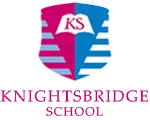In all subjects, teachers strive to spark imaginations, exploring ideas in new and unexpected ways. This is encouraged through asking big questions, developing pupils’ creative and critical thinking skills.
Curriculum
English
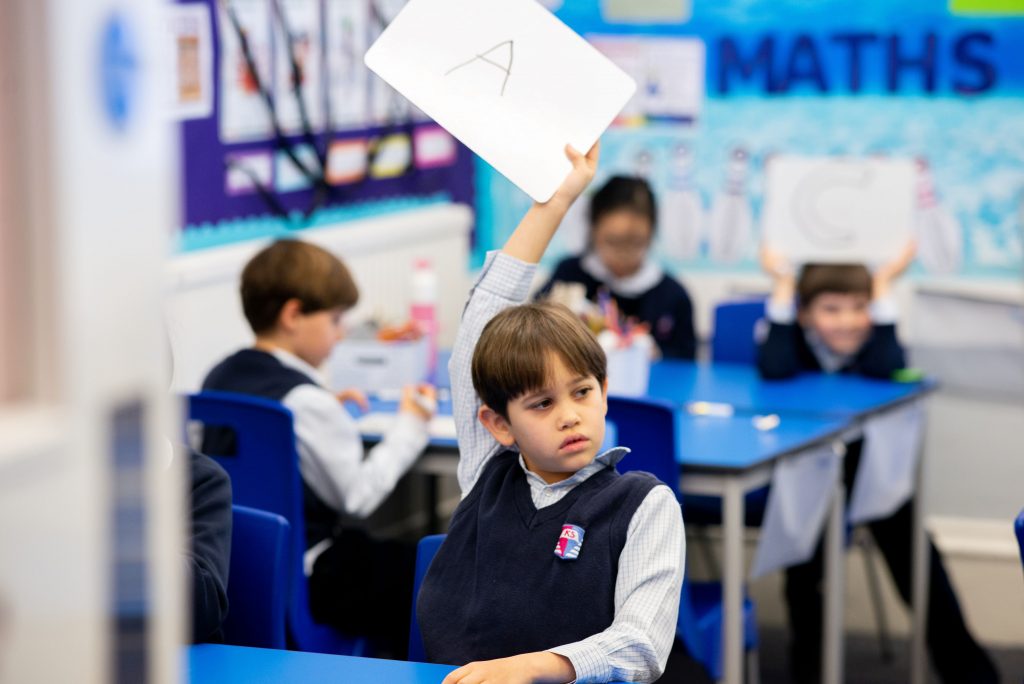
English
The English Department at Knightsbridge School operates a flexible curriculum that balances linguistic and literary work according to the children’s ability. In the Junior School (year 1-3), the emphasis is naturally upon technical accuracy and the acquisition of basic literacy skills.
Work is differentiated for all abilities, and the members of the Junior Team work closely with colleagues in the Learning Support Department. The English department seeks to develop pupils’ ability to communicate effectively in speech and writing, and to listen with understanding. We also seek to create enthusiastic, responsive and knowledgeable readers.
We see English as a subject that is skills based. As English teachers, we are enthusiastic about our subject, but ultimately we see our success in the creation of young people who are able to read and write with meaning, research, explore ideas, and question. With this in mind, pupils are exposed to a wide variety of prose, poetry and plays, and they engage with both fiction and non-fiction texts.
Every child comes to us with talents; we try to develop their creativity, broaden their knowledge and love of literature and help them say what they mean.
Mathematics
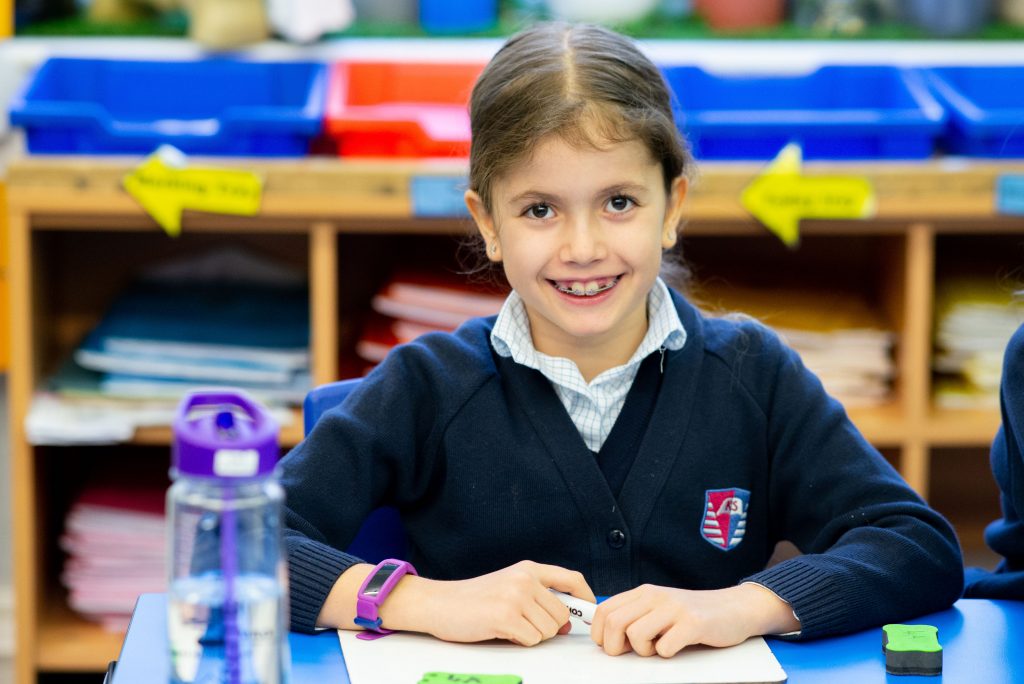
Mathematics
At KS, we employ a child-centred approach to teaching Mathematics, as we know the learning requirements for each pupil is different from one pupil to another. We combine the more conventional and traditional teaching methods with the new ideas adapted from the Government’s National Strategies. Every effort is made to help the children realise that the subject is a lot of fun where games and practical activities encourage pupils to use imagination and initiative.
It is not just about working through exercises in a book. We believe this provides a more stimulating environment and provides the children with a more relevant outlook in their understanding of other curriculum areas and the outside world. Mathematics is taught by the class teachers in mixed ability groups.
Where possible we will use as many practical activities to explore and explain the topics. The main focus in these formative years is to develop their confidence in using numbers. This will be introduced as recognition, sequencing and then starting to use the four operations (addition, subtraction, multiplication and division). Other areas such as shape, space and measures,
Handling data and basic properties of numbers will be included in this introduction and, as we work on a spiral curriculum, each topic area will be covered in more depth in its following cycle. Mental arithmetic games play a large part in the pupils’s learning as this is vital to build self-confidence. We also focus on the acquisition of times tables to aid mental arithmetic.
Science
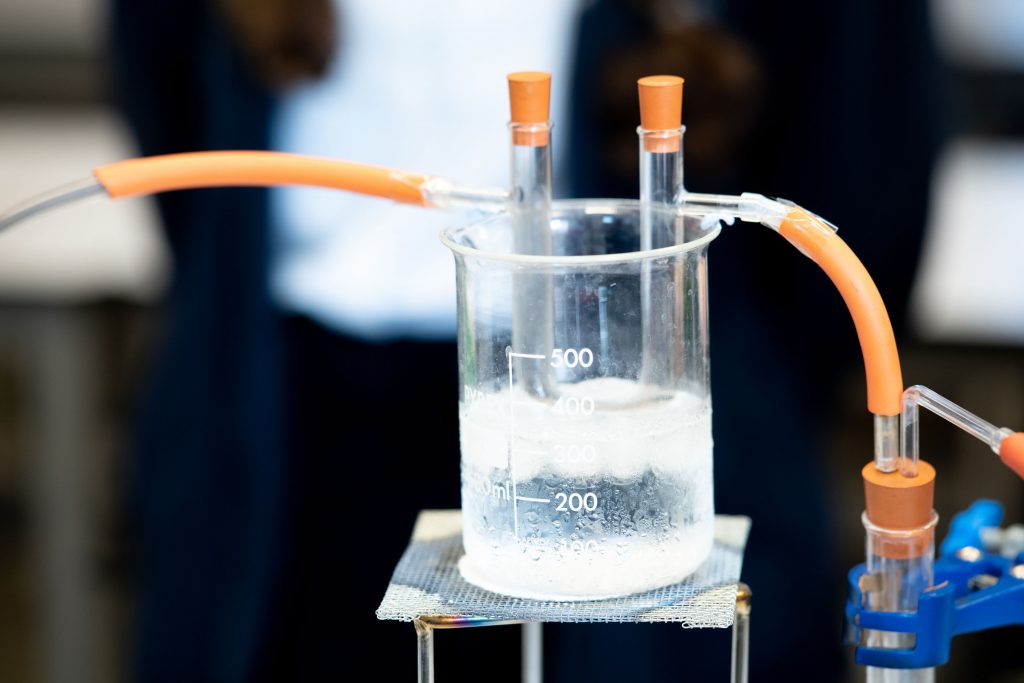
Science
The Science Department at Knightsbridge works to inspire children’s curiosity and enthusiasm about science, fostering critical thinking and enquiry skills. We carefully sequence learning to lay the foundations for children to understand the world around them, and to strive to ask, explore, and answer scientific questions.
We want children to not only understand the theory of science but to gain knowledge of the uses and implications of science, today and for the future. We build careers and diversity into the program, so that all students can build a nuanced and personalised understanding of the development of this field, as well as their place and potential within it.
Children use practical examples, models and experiences to build an understanding of scientific concepts and are supported and encouraged to test their ideas in increasingly refined ways. Upon entering senior classes, we hope for all students to be confident and eloquent scientists, who can independently select and design different forms of inquiry to answer their own questions.
Humanities
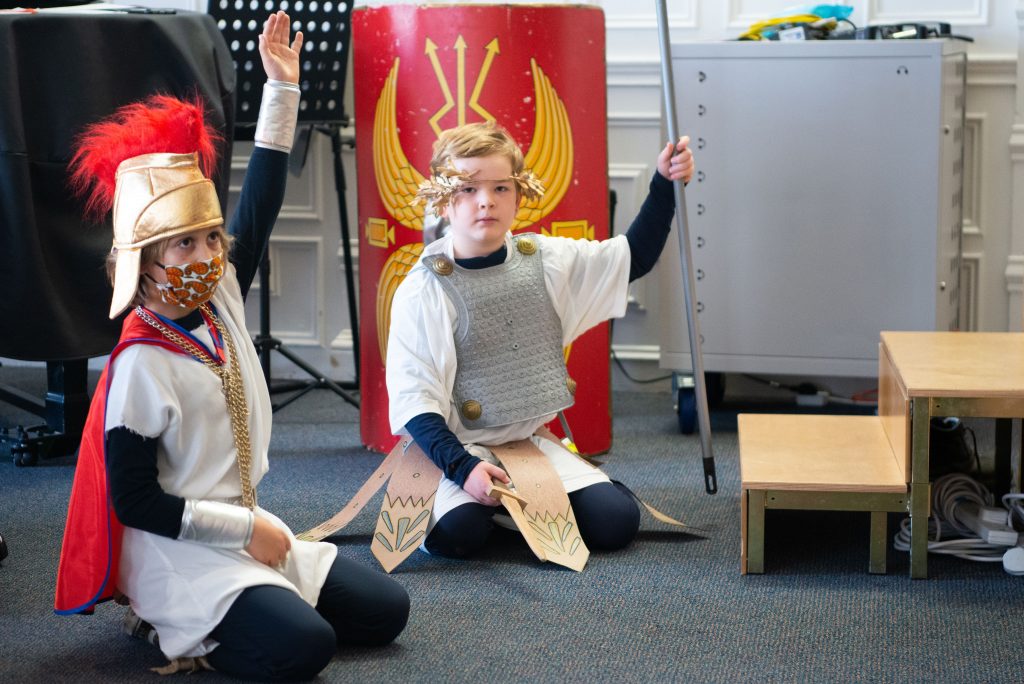
Humanities
The Humanities play a central role in our broad and balanced curriculum. Pupils learn History and Geography from year 1-6 with Classical Civilisations introduced from year 5. Building a strong understanding of the world in which is live, empowered by historical, geographical, and cultural awareness is one of key aims in Humanities. Our Perspectives course teaches philosophy, religion and ethics and encourages students to become curious and critical thinkers, empowered to engage with current affairs.
Phonics & Reading

Phonics & Reading
Phonics underpins all Reading and Writing in the Juniors and children in Year 1 are taught a synthetic phonic programme using Read, Write Inc. In this programme, children learn the 44 common sounds of the English language. Once children know these sounds, they are able to learn how to sound-blend words for reading, develop comprehension skills, improve handwriting skills and spelling and write about their reading. Children are grouped across the year group, to ensure that instruction is closely matched to their needs. Children progress quickly through the scheme and graduate into a closely tailored English programme.
We expect the majority of our children to reach this point by the end of year 1. The reading skills that children acquire early on are continually developed throughout their time at school. As role models, teachers share their passion for reading and model the skills to strengthen and support children’s reading development. This is consistent across all subjects so that children learn that reading forms the basis of so much of their education. Children will read independently in school, as well as with an adult, and this should then be continued at home so that children are practising their reading skills. Children will bring home levelled books to share at home, and comprehension and understanding skills can therefore be further developed.
Art
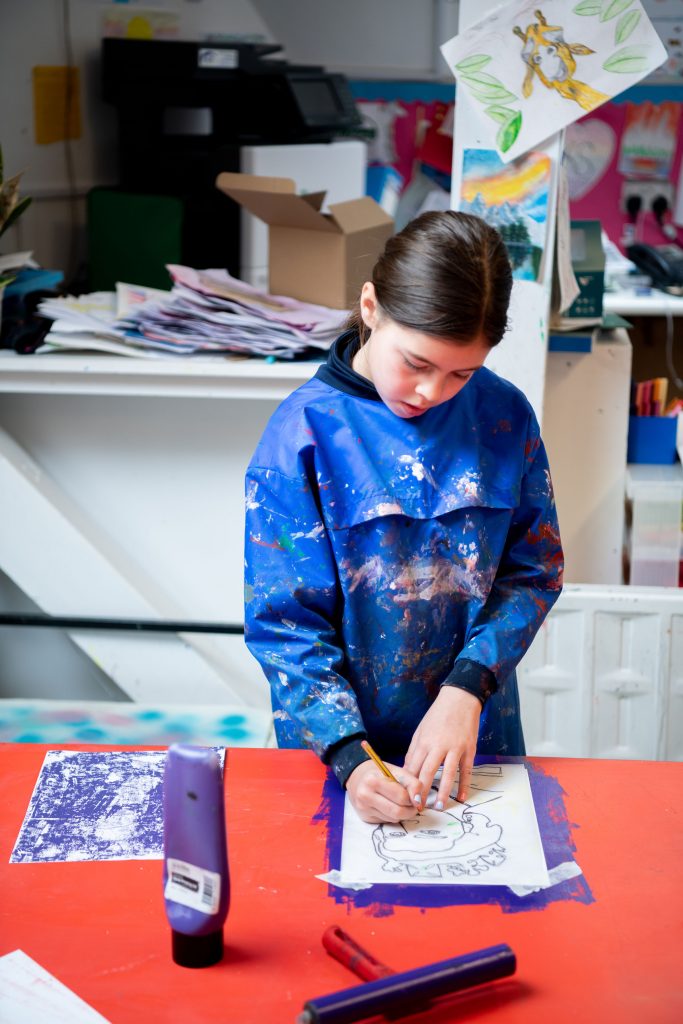
Art
Art at Knightsbridge School is taught by a specialist teacher in the Juniors. Children use the well-equipped studio right at the top of the school, allowing for a spacious working area, which is full of light. This offers an environment that is both a creative and stimulating place to work. All the children enjoy a double lesson of Art per week.
In the Juniors we also encourage children to do art activities in the classroom to link to their Inquiry topic. The main objective of the Art department is for the children to develop a love of creating. The children learn and enjoy all aspects of the process from the initial sketches to finished pieces. We aim to provide a safe environment, which encourages the children to express themselves in their own unique way regardless of attainment level.
Children are introduced to a diverse range of artists, movements and culture. They are exposed to a wide variety of materials, mediums and processes: drawing, painting, textiles, perspective, sculpture, ceramics, batik, printmaking, collage; in order to give every child the opportunity to discover their own potential. Large-scale projects and individual works are displayed proudly around the school and where appropriate entered into competitions and external exhibitions.
Computing
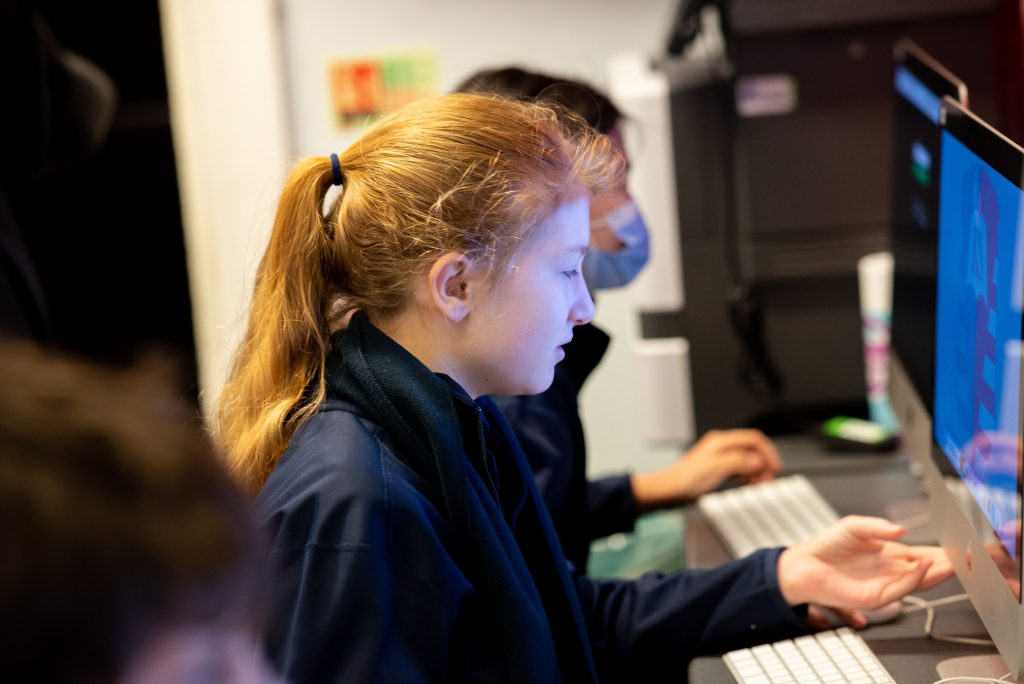
Computing
Computing at Knightsbridge School is an exciting, diverse and creative subject. Emphasis is placed on teaching transferable skills that enable students to use ICT both as a tool to produce well-presented work and to communicate ideas effectively. Making sure that forthcoming generations are up-to-date with new technology is always a challenge.
Students at KS will be exposed to the latest software and hardware so that they will be equipped to deal with the ever-changing nature of the technological 21st Century. In year 1 and year 2 pupils are taught ICT skills through their Humanities lessons by the pupil’s teacher on either laptops or their class Chrome books. In Year 3 pupils have a specific Computing lesson which is taught by a specialist teacher in the ICT suite. ICT is extensively used in all other lessons in order to enhance the learning experience of other subjects.
In the Juniors, classrooms have banks of brand new Chromebooks to allow pupils to explore ICT at various times throughout the day. All classrooms are equipped with interactive whiteboards and each teacher has an iPad to further enhance learning and capture films and photographs.
Languages
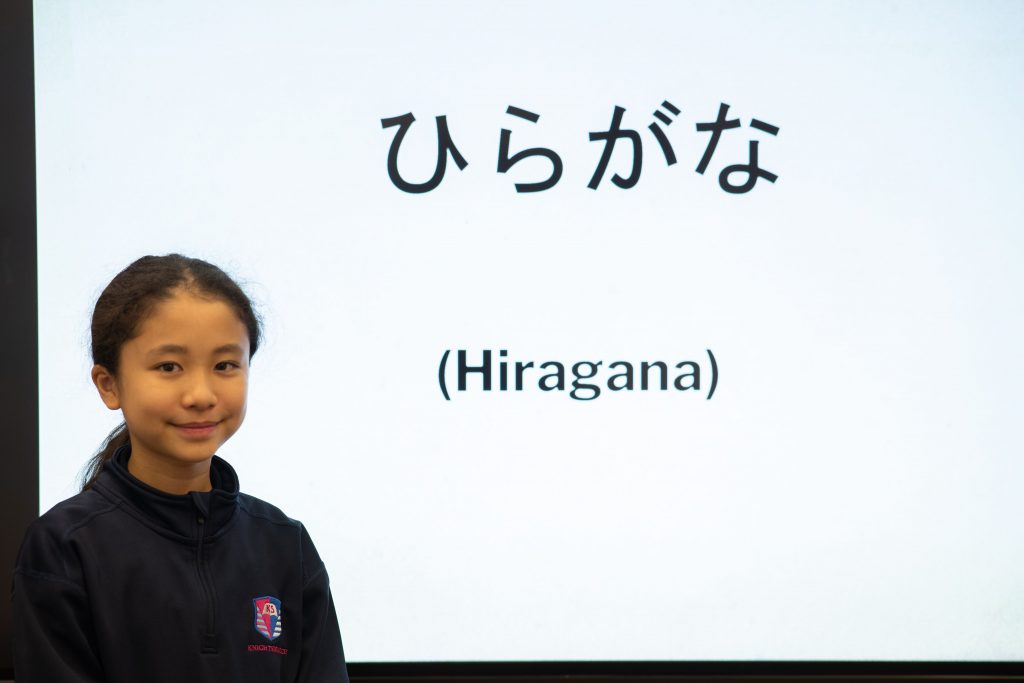
Languages
All pupils study a language, choosing from either French or Spanish. Each pupil continues with the same language from year 1-3 to in order to best develop their reading, speaking and listening skills. In year 4 the options broaden, and pupils can either continue with the same language or pick up Italian or Mandarin instead. Pupils learn languages through stories, games, role play, rhymes and songs. Emphasis is put on spoken language.
